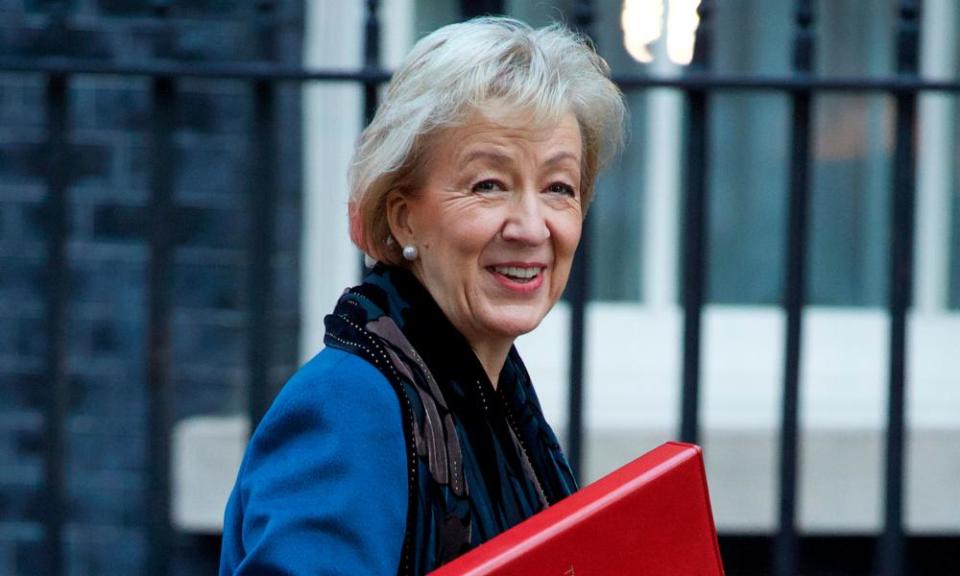Brexit deal: five ministers lobby May to renegotiate draft text

Five Eurosceptic cabinet ministers are pressing Theresa May to make last-minute changes to her controversial Brexit deal.
Having opted to remain in the government, Michael Gove will work with other Brexit-backing cabinet ministers to urge the prime minister to seek to go back to Brussels and renegotiate, in particular over the Irish backstop, Whitehall sources say.
The leader of the Commons, Andrea Leadsom, is expected to convene a meeting early next week with Gove, Liam Fox, Penny Mordaunt, Chris Grayling and potentially others who share their views.
They are then expected to press May to try to improve the details of the withdrawal agreement that deal with exiting the backstop.
Asked if pizza would be served, one source said: “Maybe less pizza, more getting down to business.”
No-confidence proceedings
Forty-eight Conservative MPs would need to back a no-confidence vote in Theresa May to trigger a leadership contest, according to party rules.
There are two ways a contest can be triggered, most obviously if the leader of the party resigns. If they do not, 15% of Conservative MPs must write to the chairman of the 1922 Committee of backbench Tories. With the party’s current crop of 317 MPs, 48 would be needed.
After David Cameron announced his resignation, five Tory MPs stood for the leadership. Unlike Labour party rules, under which candidates go to a ballot of members as long as they have the support of 15% of the party’s MPs, Conservative candidates are whittled down to a final two before party members have their say.
The ballot is based on “one member, one vote”, but in 2016 one of the final two candidates, Andrea Leadsom, withdrew from the race after a damaging interview with the Times about the fact that May did not have children. Her withdrawal meant May was made party leader without having been elected by members.
Questioned in her constituency by Sky News, Leadsom said she was “absolutely determined to support the PM in getting the best possible deal for the UK as we leave the EU”.
She added: “There is still more to be done and we do still have more time before the EU council [meeting] at the end of the month, so I’m absolutely committed to getting the Brexit that 17.4 million people voted for.”
May conceded in her three-hour Commons grilling on Thursday that she shared some of her colleagues’ concerns about the backstop. But negotiators on both sides are adamant the deal is the best Britain could have got.
The prime minister revealed her draft withdrawal agreement with the EU on Wednesday, setting out the terms of the UK’s departure and the transition period. But the 585-page document has received a backlash from people across the political spectrum – including from members of her own party.
Shortly after May announced the deal had the backing of her cabinet, the Brexit minister, Dominic Raab, and the work and pensions secretary, Esther McVey, resigned. They were quickly followed out of the government by a number of junior ministers.
May defended her deal in a three-hour Commons session, during which several MPs openly declared they would vote against the agreement. With Labour’s frontbench and hard Brexiters refusing to back the deal and May’s party in open revolt, many MPs called on May to face up to the reality that she would struggle to get her deal through parliament.
As May took questions from MPs, the high-profile Brexiter Jacob Rees-Mogg, the chair of the European Research Group, asked if he should write a letter of no confidence. More than 20 Conservative MPs have publicly said they have submitted letters of no confidence in the prime minister. Under Conservative party rules, 48 Conservative MPs must write letters to trigger a confidence vote.
The group of five ministers are reportedly hoping that by changing the most controversial details of the withdrawal agreement, May could avoid both a vote of no confidence and a defeat in parliament. Under the current arrangement, the UK would not be able to leave the Irish backstop without the EU’s consent.
May has vowed to see her agreement through and warned her Tory opponents that their alternate Brexit plans would not make their problems disappear.
In an interview with the Daily Mail, she said: “People say, ‘If you could only just do something slightly different, have a Norway model or a Canada model, this backstop issue would go away’. It would not. That issue is still going to be there.
“Some politicians get so embroiled in the intricacies of their argument they forget it is not about this theory or that theory, or does it make me look good.”
The Conservative party chairman, Brandon Lewis, said May was “prepared for anything”, when asked on BBC Radio 4’s Today programme if she was ready for a leadership challenge.
He added: “When we see various different organisations and groups talk about different ways of leaving the EU – Norway, Canada, all of these things – what we have to be clear about … is all of those require a backstop.”
Though the “group of five” are hoping to to persuade May to change her deal, EU member states have collectively ruled out any redrafting. Michael Barnier, the EU’s chief Brexit negotiator, told EU ambassadors they should not engage in “bargaining”, despite the deepening political crisis in the UK.
Later on Saturday, the Irish foreign minister, Simon Coveney, said British ministers were “not living in the real world” if they thought they could renegotiate the divorce treaty agreed with the EU.
“This idea that now after two years of negotiation, somehow four or five cabinet ministers can negotiate a different outcome and agree it themselves, and then expect the EU to just sign up to that, I just think it’s not living in the real world,” Coveney told a podcast recorded by the Irish Times at his Fine Gael party’s annual conference.

 Yahoo News
Yahoo News 